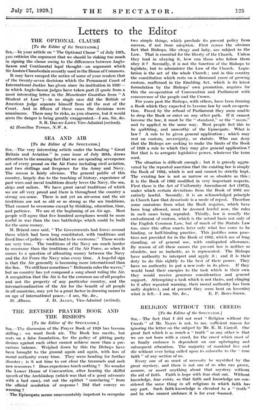SEA AND AIR
[To the Editor of the SPECTATOR.]
SIR,—The very interesting article under the heading " Great Britain and Aviation " in your issue of July -20th, draws attention to the amazing fact that we are spending sevenpenee out of every pound on the Air Force including civil aviation, and two shillings and fivepence for the Army and Navy. The reason is fairly obvious. The general public of this country, largely due to the teaching of history, experience of past wars and naval traditions dearly loves the Navy, the sea, ships and sailors. We have great naval traditions of which we are all very proud and there is throughout the country a strong sea-sense. There is not yet an air-sense and the air traditions are not so old or so strong as the sea traditions. That cannot be overcome except by thinking, education, time, and patience. We are at the beginning of an Air age. Most people will agree that five hundred aeroplanes would be more useful in war than the two battleships which could be built for the same money.
M. Briand once said, " The Governments had forces around them which had been long constituted, with traditions and fixed lines of policy—which had to be overcome." Those words are very true. The traditions of the Navy are much harder to overcome than the traditions of the Air Force, so when it comes to a question .of allocating money between the Navy and the Air Force the Navy wins every time. A hopeful sign is that the Air generally is becoming more international than the Sea. We still hear sometimes" Britannia rules the waves," but no country has yet composed a song about ruling the Air. A recognition that the Air is for the common use of all peoples and not the property of any particular country, and the internationalization of the Air for the benefit of all people in all countries, may yet be a great factor in drawing nearer to an age of international peace.—I am, Sir, &c., St. Albans. J. D. ALLEN, Vice-Admiral (retired).


































 Previous page
Previous page